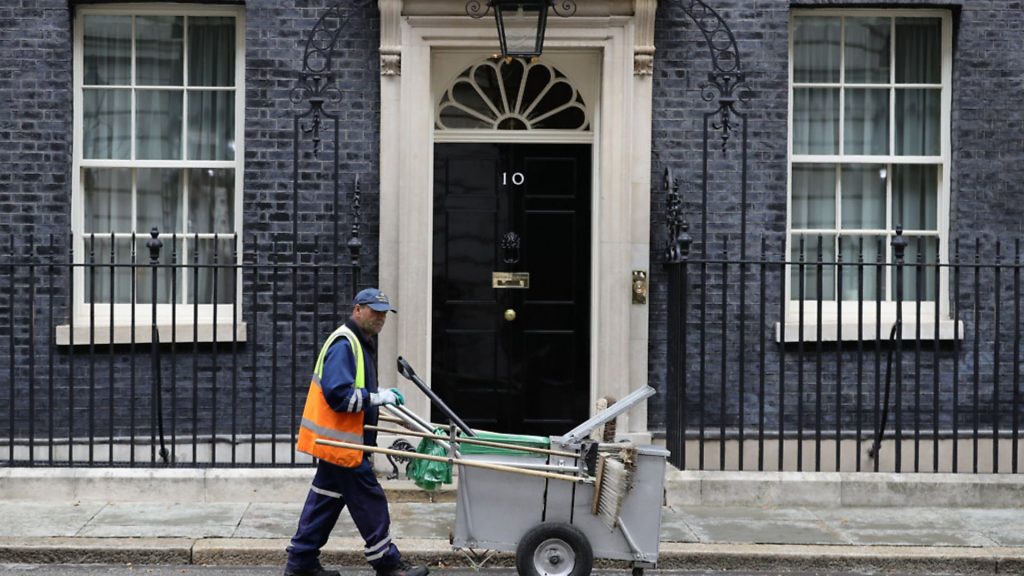
It took him longer to form a government – six days – than anyone else since the war, because his no-deal loyalty pledge reduced the field even among ambitious Tory MPs and peers, says ANDREW ADONIS.

Every Sunday morning I visit Kenwood House, the magnificent bequest to the nation of the Guinness magnate Lord Iveagh, near Hampstead.
This is partly for the walk and the spectacular view over London. But it is also to commune with Gainsborough’s striking portrait of William Pitt, Britain’s youngest prime minister.
All of 24 years old, Mr Pitt looks wise, amused and enigmatic, and I like to speculate what he would make of today’s affairs. Last Sunday I had an extra question to put to him. As one who formed an administration expected to last a few days – Mr Pitt’s first government was dubbed the ‘mince pie administration’ because it wasn’t expected to make it until Christmas, but went on to last 17 years – how long did he think Mr Johnson would last?
Pitt is a warning against minimising the durability of governments and the huge resources of the premiership in patronage and policy initiative. Pitt was a competent orator who held his own in Parliament. This is Johnson’s skill too, witness his successful first outing against Jeremy Corbyn in the House of Commons. Indeed Johnson’s whole career is a triumph of rhetoric and little else.

The first test for both Pitt and Johnson – who alike took office amid deep political crisis – was to form a government at all, and to immediately get into recess and breathing space.
Johnson has managed this first week. It took him longer to form a government – six days – than anyone else since the war, because his no-deal loyalty pledge reduced the field even among ambitious Tory MPs and peers. The resignations and sackings – 17 members of the Cabinet alone – make Harold Macmillan’s night of the long knives look like an exercise in continuity. The barrel was scraped so hard that even Nadine Dorries is one of Her Majesty’s ministers, appropriately for a government which is a Westminster take on I’m A Celebrity … Get Me Out Of Here.
However, the government is formed, there was no initial parliamentary vote of no confidence, and a long recess secures Johnson until September and probably until October when he faces his no-deal high noon.
Prediction is a mug’s game, but here is mine. When it comes to high noon, Johnson will survive – beyond Christmas if not for 17 years – if he successfully finds a way out of Brexit, however labyrinthine. But he will soon be gone if he attempts no deal or any actual Brexit on October 31.

Johnson has no credible strategy for Brexit – least of all no-deal – but having achieved his lifelong ambition of ‘world king’ on this ticket alone, his opening gambit is to sound upbeat about getting out on October 31, do or die, hoping this creates an alternative reality which makes it possible. This is the pugilistic plan of Dominic Cummings, the much over-rated Maoist who is playing the same ‘wreak havoc and see how the pieces fall’ game in the first days of Johnson that Steve Bannon played in the first days of Trump.
However, ramping up no-deal, insulting the Irish, and daring the European Union to do its worst, is risible. Mrs May played all these tunes, in minor key, in the desperate months after her deal was rejected by Parliament in January. Replaying them in C Major isn’t going to make them any more triumphant.
Rhetoric first hits reality this week with the Brecon and Radnor by-election. If this is a Lib Dem victory, in a key Lib Dem-Tory marginal, then goodbye to the Johnson honeymoon. Any snap election strategy – also copyright Theresa May – becomes an idle threat unless Johnson is so foolish he follows her in carrying it out, a course which probably leads to a second referendum in two stages.
The most revealing decision Johnson took in his first week was not to call a snap election. Faced with an intractable Parliament and EU, and weak control even of his own party’s MPs, this was the real ‘do or die’ strategy. I thought Cummings might have persuaded him into it as an amazingly bold seizing of the agenda and the initiative.
It might have worked, with a Tory-Brexit pact confronting Corbyn. Farage clearly wanted such a pact, which was given the blessing of Trump himself, who received Farage almost as an ambassador on Johnson’s first day. A snap election would have subsumed the Brecon by-election.
Johnson didn’t call the election – his best, maybe only, chance of creating an alternative reality before October – because his nerve failed. Like May, Brown and Callaghan before him, he hasn’t seized the crown only to face the prospect of becoming the shortest-lived prime minister since George Canning in 1827, who died within four months.
But where is there now to go? There will be no substantive EU negotiations. There will be no parliamentary majority for no-deal. Only a political strategy of shocking unconstitutionality will make this even seem possible until late October. Maybe there will be an election called before noon, but as of now, that looks like death by a thousand cuts.
Mr Pitt said all this to me last Sunday. And he said another thing. “From my experience of fighting Napoleon, which ultimately killed me,” he whispered, “it doesn’t matter how much you rubbish the French, the Germans and the Irish, don’t underestimate them. And don’t think isolation in Europe can work. Good rhetoric, mad policy.”
Warning: Illegal string offset 'link_id' in /mnt/storage/stage/www/wp-includes/bookmark.php on line 357
Notice: Trying to get property 'link_id' of non-object in /mnt/storage/stage/www/wp-includes/bookmark.php on line 37






